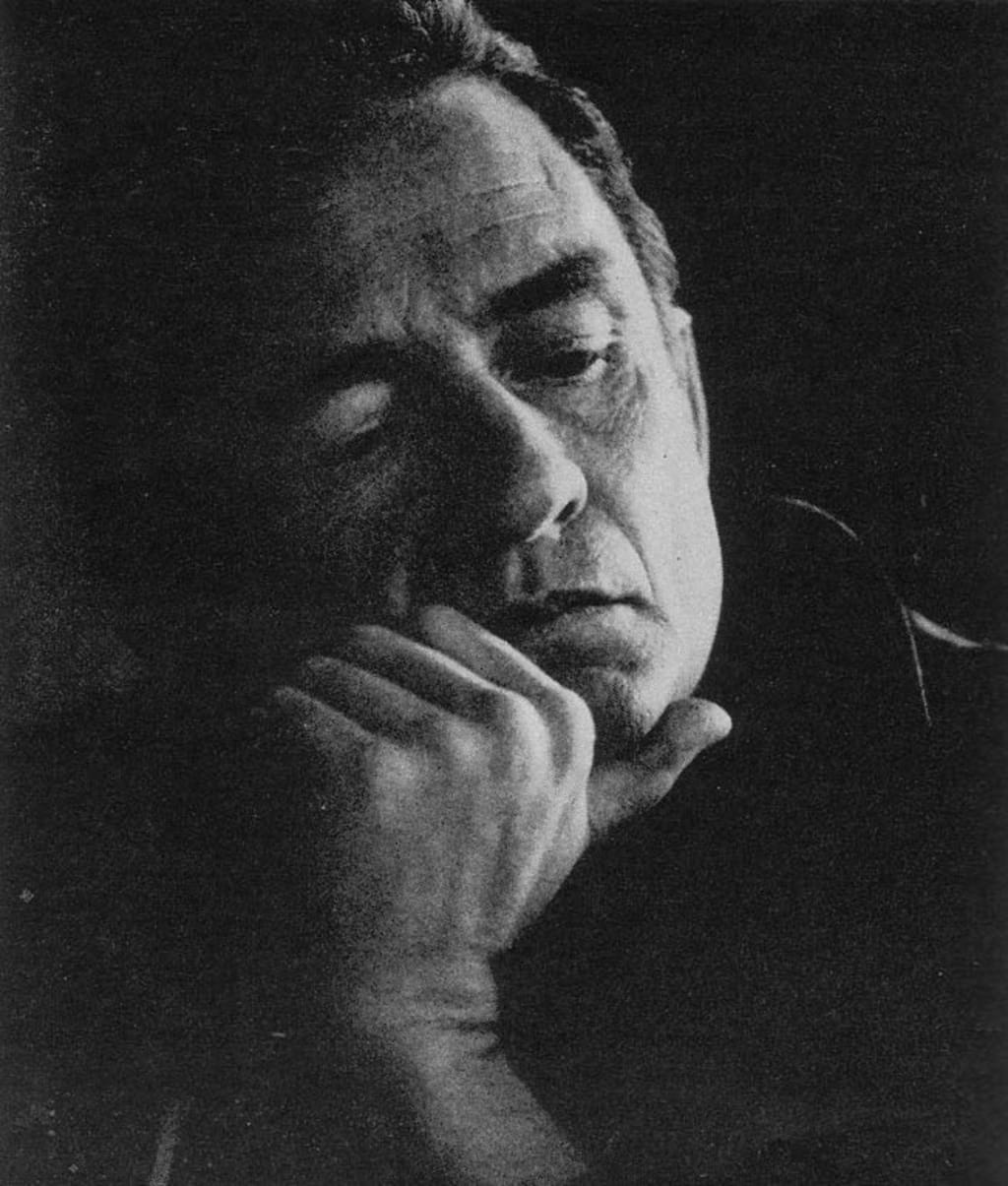
"God has his hand on you."--Carrie Cloveree Cash
The image of Johnny Cash is as indelible as that of Elvis Presley or James Dean, Marilyn, or Judy Garland--an American Icon, an original from a country that once was known for birthing the cultural milestones that would rock the rest of the world. I'm no expert on the man's life; I know that his father laughed sardonically when someone quipped "John's going places," laughed, and replied. 'Yeah, he's going right back into those cotton fields."
He went on to become one of the bestselling musicians of all time. A literal, living piece of Americana, a lost, lonely figure from an era, an America, that no longer exists. He exemplifies, on one hand, the cornball optimism of the "American Dream"; the rags-to-riches story that we're all supposed to believe in fervently, as a matter of faith. "Well you ask me why I always dress in black, why you never see bright colors on my back," he sang. There was a dark side to his success, a feeling that, but for the Grace of God, he might have ended up "in those cotton-picking fields," or killed like his younger brother, in an accident involving a bandsaw.
He played (as bands like Metallica would do later) to the inmates of San Quentin and Folsom Prisons, men lost and hopeless and condemned by society and doomed to die behind bars, many violently. Yet, when you listen to these recordings there is no artifice in this, no gimmick: Johnny Cash is as real, as authentic as if he could go down in that violent crowd and mix with them, be one of them, on their level. But "for the Grace of God," he would be there. Johnny Cash reminds us that, but for the Grace of God, we would ALL be there.
That he struggled with drugs and alcohol is almost legendary. A disturbing early photo of him, during this period, shows a gaunt, skeletal man who faintly, at this point, resembles Abe Lincoln. He could have easily derailed and died a hundred times. June Carter Cash, the love of his wife, helped pull him from the brink. But it was also the Hand of God, whatever you want to call Him.
I'm not turning this short piece into a biography, because I largely find such biographies boring. Instead, I want to resurrect and celebrate his memory as a living ghost, a piece of the past that is fast disappearing. To desperate men, songs such as "Folsom Prison Blues," and "Walk the Line," come from a place as deeply spiritual and full of the heartache and despair of the American Underclass as any old-time gospel or ballad could hope to do. He spoke to us in his deep, resonant baritone, that unmistakable voice of the "Man in Black", who took on the burdens of the poor and downtrodden; who told their story.
An incident with kicking out the footlights of the Grand Ol' Opry saw him banned from there; but, finally, it didn't matter. Johnny Cash, his karma, his spirit, was headed ever-upward, regardless of what stumbling blocks should be placed in his path, or whatever excesses and personal demons tormented him, threatening his existence. He bested them all. He broke the chains, like Harry Houdini, and achieved what he did against all odds.
Ever present at his side was June Carter Cash, the love of his life, the apple of his eye. His "bridge over troubled waters."
Cash was a man that knew how to change with the times. He covered songs by Soundgarden, and his last and most famous music video "Hurt" was originally a much-different song by industrial metal pioneer Nine Inch Nails.
As much as Johnny revered the country, too, he was not afraid to criticize its horrific war in Vietnam: he sang, in front of a group of young college students, opposed to the war, "each week we lose a hundred fine young men." This brought cheers and clappings for the man who "wore the black for the poor and beaten down."
And he understood every one of them because he was one of them.
I began to listen to Johnny Cash nearly ten years ago because I felt the world slipping away. I felt the betrayal of a Dream, an America that has died along with most of my close relatives. An era of innocence and simplicity, but a life of struggle and often hardship. A world where you could still revere the country, but realize the nucleus of corruption that festered, like a malignant tumor, at the heart of What It Was. Johnny Cash is backyard barbecues, church on Sunday, your kin that has gone on, those you'll never see again. He's a lonely train whistle calling out plaintively in the American Night.
I well remember the day he died. It was September 12th, 2003. The day before, popular television actor John Ritter, who became famous for portraying the hapless "Jack Tripper" on the classic television sitcom "Three's Company," had died suddenly, tragically, of a rare heart condition, at the age of 54. The next day, Cash died, somewhat overshadowing Ritter's death, but this was unavoidable. When a legend goes, it's hard to mentally process it. I couldn't, at the time, envision a world where there was no Johnny Cash. Or at least, a culture bereft of that great, deep, distinctive, plaintive wail, that spoke for all the lost men, the little men, the hard-luck cases, and the prisoners of the world.
Like the Welsh "Sin Eater," Johnny Cash, through his music, "carried off a little darkness on his back." And like an Old Testament prophet, his black-clad, somber visage rebukes the world for what it is slowly becoming, all the while telling the stories of those who are caught up in the grinding dystopia of America, 2023.
His final video, "Hurt," encapsulates his life in a flurry of stock footage images: Johnny Cash in Israel, making a religious movie, Johnny climbing aboard a train, like an old-time hobo or bindlestiff; John visiting the small house wherein he grew up. The Johnny Cash Museum. Tears and smiles, walking a beach with his wife, her ghost standing behind him. He tells us that everyone he knows goes away in the end; the final, comic summation of life on this Earth. The final image of him sitting on a stool, with his head bowed, as the lights go down, leaves the viewer of the video wondering if he is here, somehow, reviewing his life and choices, and judging his own soul; the show is over, the lights have gone down; the curtain has closed. A what am I? the image seems to beg the question.
But to go any further with this essay is pointless. He'll live forever in our electronic culture, as long as the world still spins. The Man in Black. He told Our Story, and found out that it belonged to everyone.
Rest in peace, Johnny.
About the Creator
Tom Baker
Author of Haunted Indianapolis, Indiana Ghost Folklore, Midwest Maniacs, Midwest UFOs and Beyond, Scary Urban Legends, 50 Famous Fables and Folk Tales, and Notorious Crimes of the Upper Midwest.: http://tombakerbooks.weebly.com
Reader insights
Outstanding
Excellent work. Looking forward to reading more!
Top insight
Expert insights and opinions
Arguments were carefully researched and presented






Comments (3)
I still can't believe it's been twenty years since he left. I remember listening to him on 8-Track in the car as a kid with my brother. I distinctly remember hearing The Duelt with June, "Jackson" Johnny, Like Elvis and John Wayne, were just always there. Part of my growing up. Johnny, Waylon, Willie, and Kris were always there. I was never into hard rock or metal or any of the newest pop music, with very few exactions, say ABBA, I grew up listening to early country, then I discovered Andy Williams, Perry Como, and Henry Manici, and all his great TV and Movie music. Today, I listen to Miles, Coltrane, and Jazz in general most of the time. But every once in a while I pull out Johnny, and Waylon and listen to the last of the real country music. In the 70s there was s special called Half a Mile a Day, or something similar that had Johnny and June, going back to their roots and visiting the house he grew up in, Thats what a lot of the footage in Hurt is from. I couldn't hardly watch Hurt, the first time I saw it. Even today it still gets to me.
I used to listen to his songs on repeat, especially Hurt. It's the first song of his I heard, and I came across it accidently, looking for some other song the name of which I couldn't remember. But I haven't seen his final video, watched it now and felt the lyrics with my heart once more. Thank you for your post!
This is an excellent essay on a true artist. My dad got me into JC and it was strange how as a teenager I was berated for liking JC but now he is on of the coolest artists to have in your collection